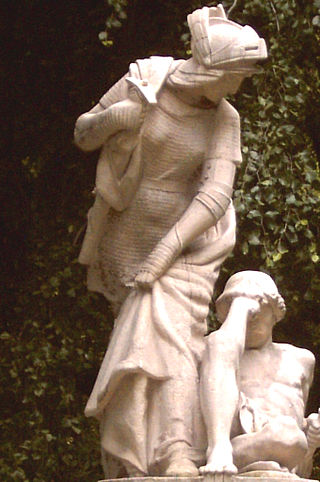Top Qs
Timeline
Chat
Perspective
Grażyna (poem)
1823 Narrative poem by Adam Mickiewicz From Wikipedia, the free encyclopedia
Remove ads
Grażyna is an 1823 narrative poem by Adam Mickiewicz, written in the summer of 1822 during a year-long sabbatical in Vilnius, while away from his teaching duties in Kowno.[1]
You can help expand this article with text translated from the corresponding article in Polish. (July 2025) Click [show] for important translation instructions.
|
The poem describes the exploits of a mythical Lithuanian chieftainess Grażyna (Lithuanian: Gražina) against the forces of the medieval Order of the Teutonic Knights. The woman character is believed to have been based on Mickiewicz's own sweetheart from Kaunas, Karolina Kowalska. The name was originally conceived by Mickiewicz himself, having used the root of the Lithuanian adjective graži, meaning "beautiful".[2]
It was said by Polish writer Christien Ostrowski to have inspired Emilia Plater, a military heroine of the November 1830 Uprising.
Remove ads
Musical settings
In 1933 the poem served as the basis for the first opera in the newly independent Lithuania.
In 1955, Ukrainian composer Boris Lyatoshinsky composed an eponymous orchestral work based on the poem in commemoration of the centenary of Mickiewicz's death.[3]
References
External links
Wikiwand - on
Seamless Wikipedia browsing. On steroids.
Remove ads

